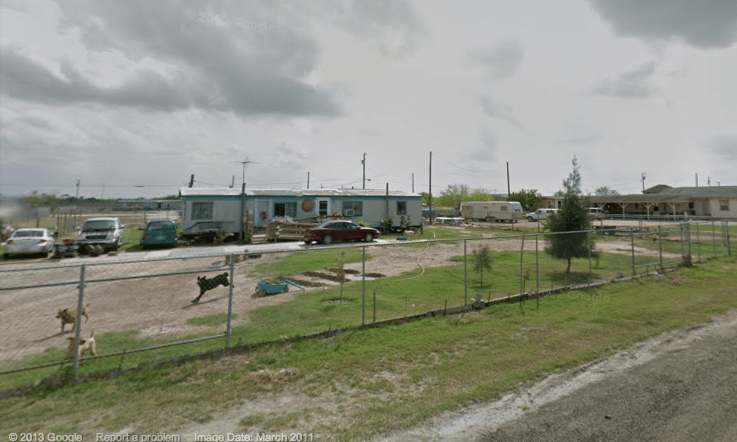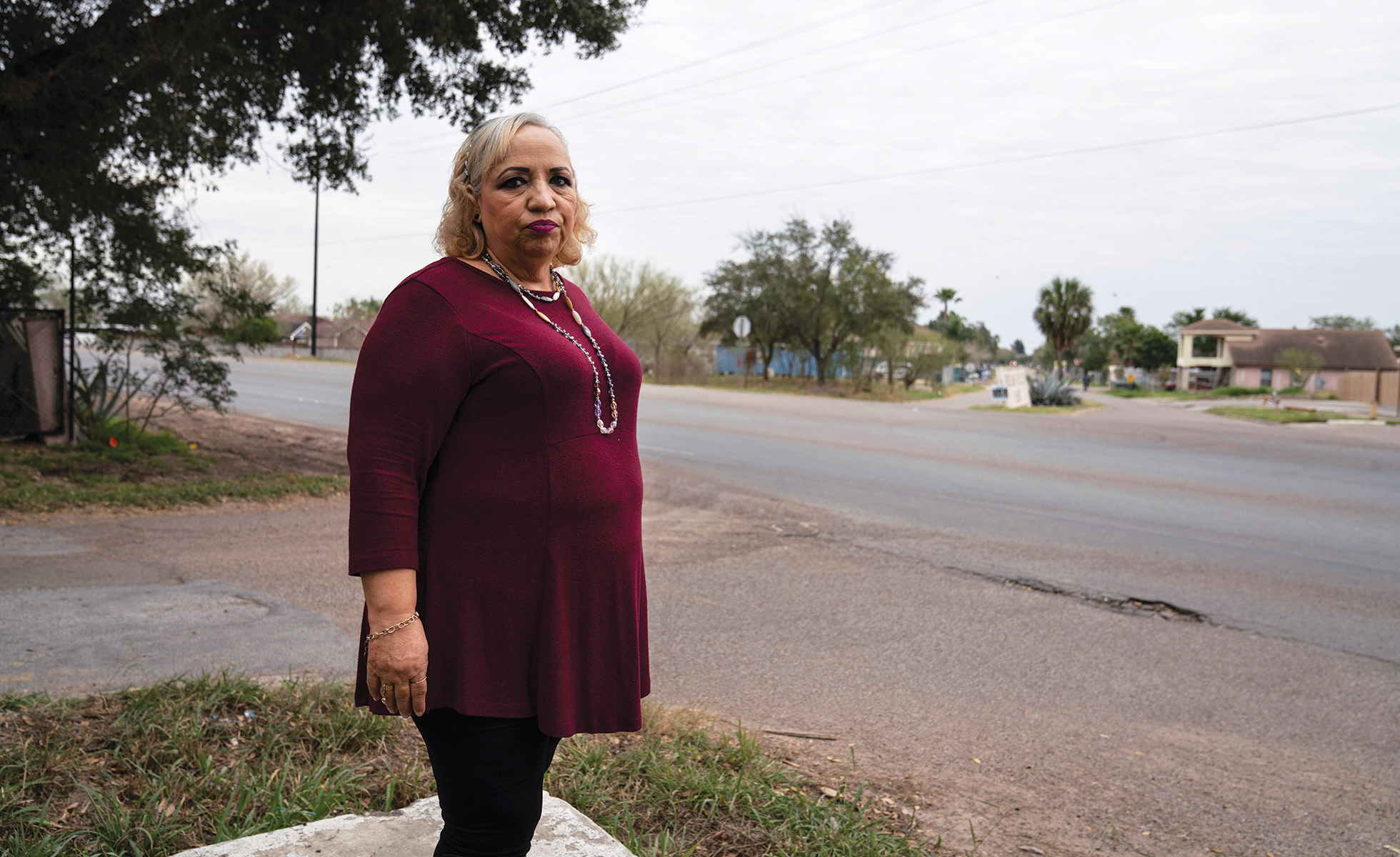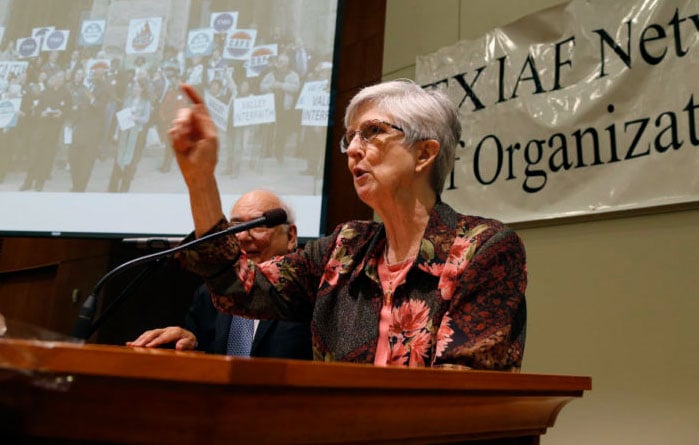
Advocates: Legislation Would Roll Back Tough Colonia Regulations
Manuela Luna’s colonia near Mercedes, Texas is no suburban paradise. Spanish Palms, a small low-income community of 25 people, lacks paved roads, but at least there’s running water, electricity and septic systems on the inhabited lots — basic services absent at many of the hundreds of other colonias along the Texas-Mexico border. Luna pays about $200 a month for her half-acre lot and the mobile home she’s lived in since 1997.
Spanish Palms is a step up from the first colonia lot Luna bought in 1979. Back then, unscrupulous developers haphazardly carved up cheap rural land and sold lots to low-income buyers without the usual legal niceties or the basic services expected in subdivision development.
Luna is worried that legislation filed by one border lawmaker could undo much of the progress she’s seen in her life.
Rep. Ryan Guillen’s (D-Rio Grande City) House Bill 611 would loosen several restrictions lawmakers placed on border developers in the 1990s in an effort to stop the proliferation of new colonias. Specifically, the bill would:
- allow border developers to advertise lots before basic infrastructure is complete. (Currently, no advertising is allowed before a plot is appropriately developed.);
- allow potential buyers and sellers to enter into earnest money (or pre-sale) contracts of up to $250; (Currently, no money may change hands until a plot is ready to be sold and has basic services);
- create a 90-day “cure period” for developers that make “minor” mistakes without immediate penalty (Currently, any infraction is followed up with a penalty.)
In a recent committee hearing, Rep. Guillen argued that the current laws are too restrictive and are hampering new, low-income development desperately needed in the fast-growing border region.
Current laws mandate that developers must inform buyers and provide basic infrastructure for any new residential subdivisions within 50 miles of the border, to avoid the proliferation of new colonias.
“We have made every effort to make sure that wrong-doers are going to be sought after and prosecuted,” Guillen told the House Land and Resource Management Committee. “We’re just making reasonable changes to things that just went a little overboard.”
Some advocates, including Emily Rickers from the Alliance for Texas Families, a fair housing advocacy group, are worried that Guillen’s bill could weaken colonia regulations.
“I think that it’s mostly about developers wanting to cut corners and… start to roll back these rules in ways that are much bigger and deeper than what you see in this bill,” Rickers told the Observer. “This is just the beginning.”
Rickers said corrupt land developers continued selling land until the Legislature passed reforms in the 80s and 90s. The unchecked development created a legal mess that’s taken decades to untangle.
“People didn’t have legal descriptions for the lots they had purchased. Maybe the seller would get one legal description and then try to use that over and over again so you’d have a whole neighborhood of people that technically purchased the same lot,” Rickers said. “It was a real mess.”
Before the government will pay to retrofit such colonias with water and sewer services, ownership has to be straightened out.
Manuela Luna said she didn’t know what she was getting into when she bought her first lot. She didn’t know until she read the contract for deed that she had only paid for the land and would have to pay out-of-pocket to get electricity hookups as well as water and sewage services. When she sold her lot for the current smaller one at Spanish Palms, new regulations ensured that the community would have basic services.
“I don’t want the bill to pass because we could return to the old times,” she told the Observer.
Ann Cass of Proyecta Azteca, a self-help colonia advocacy group, said that there’s no need to give developers a 90-day grace period to fix mistakes. “A good developer is a developer who can work with the rules. And if they aren’t able to work with the rules then they aren’t a good developer,” she said. “These rules are not so outlandish that they can’t be followed. They’ve been followed for 20 years.”
But Rhonda Tiffin, executive director of the Webb County planning department, said the laws are too restrictive in some ways. “I don’t think we need to take out a sledgehammer to swat a fly,” she said. “Some counties have suffered… because the good developer, the good subdivider has been scared away from doing development.”
Tiffin said HB 611 will help to ease regulations just enough to bring the good developers back to the high-demand housing areas that need them the most.
“Not one shoe fits everybody. The areas may be on the border but they are unique unto themselves. We have different issues, different things that impact us,” Tiffin said. “I think we have a law… that doesn’t always work in every part of the border.”
Guillen told the Observer he does understand why advocates are worried, but said his bill is only making a few minor changes to laws that will improve the local housing market.
“[HB 611] will put more folks from the border into a home… It will bring about more competition in the market which will make purchasing a home easier and more affordable for folks who are trying to do that.”
As of March 4, HB 611 is pending in the House Land and Resource Management committee. Guillen said he thinks the bill will pass this session. Last session Guillen’s similar bill got caught up in the Senate and didn’t make it to a full Senate vote before the session ended.


